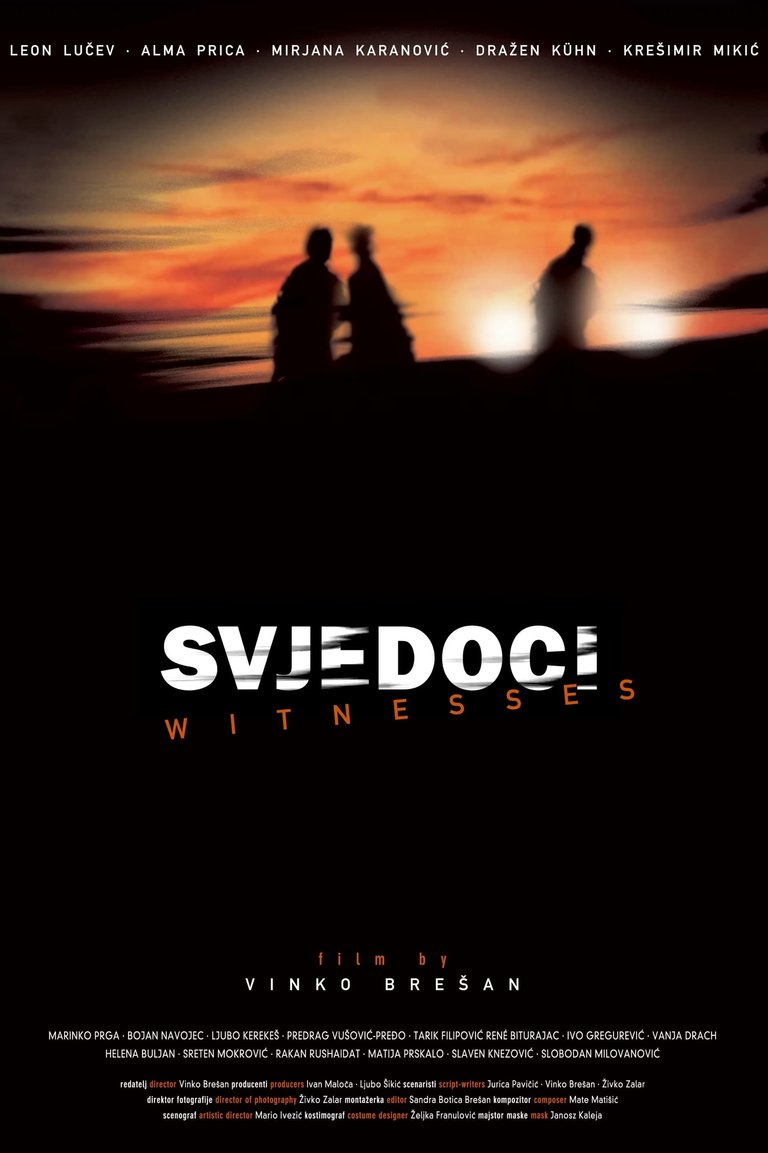Film Review: Witnesses (Svjedoci, 2003)

Vinko Brešan is arguably the most important author of Croatian cinema in three decades since country’s independence. This reputation has little with his talent or quality of his films and more with Brešan’s willingness and ability to break taboos. His 1996 feature film How the War Started on My Island has dared to deal with recently ended bloody nation-forging war as a basis for comedy. Three years later, in Marshall Tito’s Spirit, he lampooned his countrymen’s hypocritical and schizophrenic attitude towards Communist era legacy. But even more sacred cow was slaughtered in his next film, 2003 war drama Witnesses, which was supposed to become the most controversial Croatian film of early 21st Century.
The film is based on The Alabaster Sheep (“Ovce od gipsa”), 1997 novel by Croatian writer Jurica Pavičić, itself inspired by murder of Zec family, an event that is considered to be one among the darkest in recent Croatian history. The plot takes place in 1991, during the war, when the city of Karlovac is on the frontline between Croatian forces and Serb paramilitaries supported by Yugoslav federal military. Three Croatian Army soldiers – Joško (played by Krešimir Mikić), Vojo (played by Marinko Prga) and Barić (played by Boran Navojec) – are disgusted with the idea that local ethnic Serb businessman (played by Slaven Knezović) is making money by smuggling goods between the lines. They decide to take things into their hands and, while the man is away in Hungary on business trip, they try to blow up his house with explosives. Things get complicated when it turns that the man is actually in the house. They shoot him dead before realising that the killing was seen by victim’s young daughter. They abduct her and bring her to isolated garage before deciding what to do. Later, the killing is investigated by Barbir (played by Dražen Kühn), local policeman whose efforts soon become hampered by intervention of Dr. Matić (played by Ljubomir Kerekeš), physician and powerful local politician who wants the embarrassing affair to go away, while also suggesting the trio, via one of soldiers’ mothers (played by Mirjana Karanović), to end the case by permanently silencing young witness of their crime.
During the war and in the first years after mere idea that Croatian forces committed atrocities or even morally questionable acts during “Patriotic War” was anathema to large, if not majority, sections of Croatian public. Even the prospect of Croatian Army generals being investigated by war crimes tribunal in Hague and Croatian government’s willingness to co-operate in those efforts was enough to cause mass public protests, road blocks and even persistent rumours of possible military coup. In such circumstances it took real courage for a film maker to deal with issue as thorny and controversial as Croatian servicemen committing crimes against ethnic Serb civilians. Brešan further fuelled controversy by casting actress Mirjana Karanović, actress from Serbia proper (which was first such instance in Croatian cinema since dissolution of Yugoslavia) in the role of Croatian war widow. However, all those controversies failed to have much impact on the film. There weren’t any boycotts or mass protests, apart from some grumbling in Croatian right-wing nationalist media. Witnesses actually won top national film award at Pula Film Festival, and even had some good reviews by US critics, sparking (ultimately unsubstantiated) rumours about possible Hollywood remake that would have been presumably set in Iraq and feature US military servicemen as main characters. The film had unremarkable run in Croatian cinema and quickly sank into relative oblivion.
There are two main reasons for that. The first one is that Brešan in his script watered down the events that were much more sinister in real life. While the killing in the film is portrayed as accident committed by small group of traumatised soldiers, Zec affair in reality was culmination of campaign of abductions, imprisonment, torture, forced disappearances and killings that involved entire paramilitary unit serving as well-organised death squad. Unlike Witnesses, where the main motive might have been ethnic hatred or revenge, in real life the motive was material gain, with victims being chosen for their wealth that was to be taken away. Brešan could say that he had to change many details in order for his film to be simple and more comprehensible, but he compromised that with use of often confusing flashbacks, showing soldiers’ traumatic experiences on the front and featuring Ivo Gregurević as one of soldiers’ father who dies at the hands of Serbs. But the most damning aspect of Witnesses is that the ending is different than in real life. When everything seems grim a character of Krešo (played by Leon Lučev), war veteran and amputee, is brought to serve as soldiers’ moral anchor who would talk them into doing the right thing. This humanistic ending might be suitable for the work of fiction, but not for docudrama. Even in fictional context and without comparisons with real history of 1990s Croatia, Witnesses, when watched while similar events are happening all over the world, might leave viewers with very depressing thought that humanity has learned nothing in past three decades.
RATING: 5/10 (++)
_
Blog in Croatian https://draxblog.com
Blog in English https://draxreview.wordpress.com/
InLeo blog https://inleo.io/@drax.leo
InLeo: https://inleo.io/signup?referral=drax.leo
Unstoppable Domains: https://unstoppabledomains.com/?ref=3fc23fc42c1b417
Hiveonboard: https://hiveonboard.com?ref=drax y
Bitcoin Lightning HIVE donations: https://v4v.app/v1/lnurlp/qrcode/drax
Rising Star game: https://www.risingstargame.com?referrer=drax
1Inch: https://1inch.exchange/#/r/0x83823d8CCB74F828148258BB4457642124b1328e
BTC donations: 1EWxiMiP6iiG9rger3NuUSd6HByaxQWafG
ETH donations: 0xB305F144323b99e6f8b1d66f5D7DE78B498C32A7